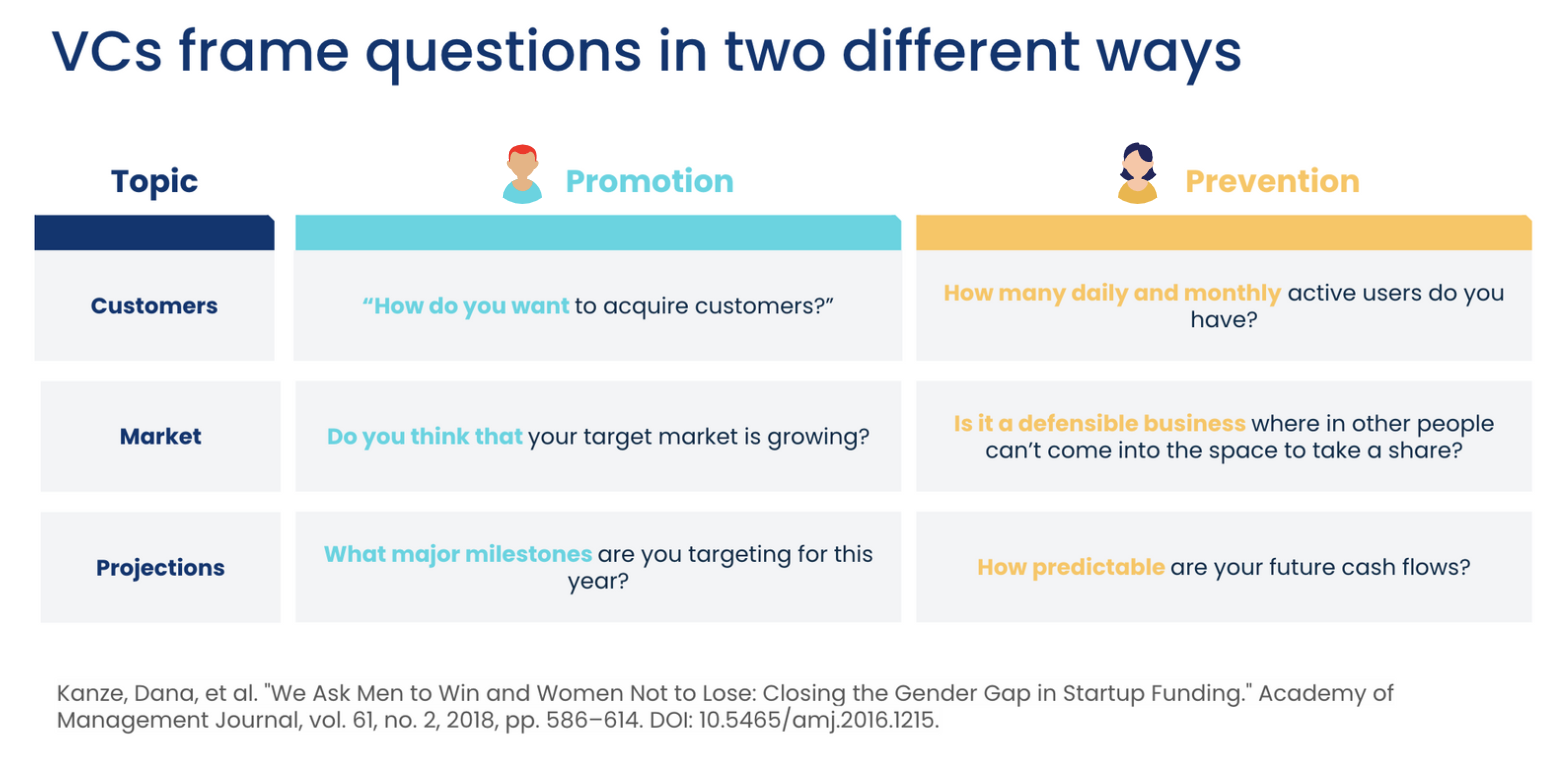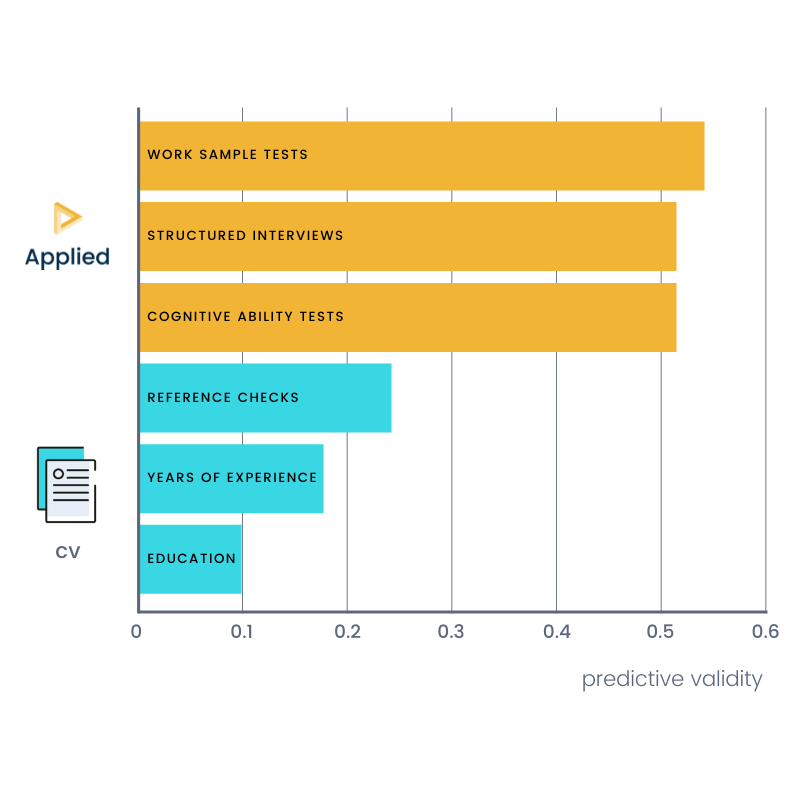
Want to turn your interviews into a repeatable, predictive science?
Traditional interviews are biased and ineffective. We make snap-assumptions about candidates that we then subconsciously look to re-enforce.
According to one study, roughly 5% of decisions were made within the first minute of the interview, and nearly 30% within five minutes.
And we might even phrase questions differently depending on the candidate…
An investigation into why female entrepreneurs continue to receive less funding than their male counterparts found that venture capitalists posed different types of questions to male and female entrepreneurs.
They tended to ask men questions about the potential for gains and women about the potential for losses.

When it comes to making this process fairer and more effective, there are only 4 key types of interview questions you need to use to quantify candidates skills/suitability.
- Work samples
- Case studies
- Work simulations
- Mission/values alignment
How do we know these types of interview questions work? Well, organisations using our assessment process tend to see 3x as many suitable candidates, 3-4x more ethnically diverse candidates and a 93% retention rate after one year.
The 4 essential types of interview questions for predicting performance
1. Structured interview questions/work samples
When it comes to spotting talent, work samples are the single most predictive assessment you can use.
Predictive validity is a measure of how accurately something can predict future outcomes, most commonly used in science and psychology.
If we look at the Schmidt & Hunter meta-analysis - which summarises 100+ years of research, we can see that ‘work sample tests’ are the most likely to predict how someone will perform on the job…
And education and experience (the things we’d typically grill candidates on) are actually pretty weak predictors of performance.

Work samples take tasks/scenarios that would realistically occur on-the-job and turn them into questions by asking candidates how they would approach them.
Here’s what this looks like in practice…
Role: Product Manager
Question: The dev team has been working towards the big release of a new tool. The planned release date is end of day tomorrow, but there are a number of bugs in it.What would you do?
Skills tested: Communication, Project management, Product development
Instead of asking candidates how they have tackled a given task in past, work samples flip your standard ‘tell me a time when’ question on its head by asking what they would do, if they encountered it today.
By using forward-looking questions, you can identify genuine skills, without relying on proxies like education and experience.

True, education and experience may have some value… but its far more predictive to test directly for skills learned through experience than to make assumptions based on someone’s background.

2. Case studies
Case study interview questions are essentially more fleshed-out work samples.
They entail giving candidates a larger project or more complex issue to think and work through.
Here at Applied, we’ll ask candidates a series of follow up questions (usually around 3-5) based on the information we’ve provided them.
Case study questions give you an opportunity to dig deeper into how candidates would actually think about the bigger projects they’ll be working on… and candidates get a real flavour of what the job itself would look like.
To create your case study questions, you could either think of potential projects or problems that candidates would face should they get the job, or simply provide the context around a real task that has already happened.
Role: Marketing Manager
Context: We believe we’re a great fit for sports organisations. Imagine you’re working on a targeted campaign aimed at the relevant people at these organisations.
Question 1: What types of problems and pain points do you think sporting organisations have that can be helped by the Applied platform?
Question 2: Give us an idea for a piece of content that we could build and share as part of this campaign
Question 3: How would you find target sporting organisation personas and how would you get the campaign out in front of them.? What would the call to action be?
Question 4: Discuss how you would make this campaign multi-channel. Which content would you use for which channel?
Question 5: You have a team of 3 (community, content and digital), how do you engage the team and split and monitor the work?
3. Work simulations
The philosophy behind work simulations is show, don’t tell.
If a task can be role played or simulated in the interview itself, why not have candidates showcase their skills, rather than just talk about them?
What could be more predictive than asking candidates to actually perform small parts of a job?
Work simulations can be particularly useful for roles that require speaking or interpersonal skills. You could have your Sales Team candidates role play a client call, meeting or presentation.
Some tasks may require some preparation time - in which case we’d recommend sending the details over to candidates a few days in advance.
Here’s how you can turn your standard interview questions into work simulations…

4. Mission/values alignment questions
Culture fit is dead.
Not only is it sometimes used as a smokescreen for bias, but research also suggests that it doesn’t say much about someone’s ability either.
You can see from the chart below that how well someone fits in with your company culture doesn’t correlate to their performance or even how likely they are to stick around.

Instead, try looking for mission/values alignment.
At its core, this is a test of whether or not candidates are excited about your organisation’s mission and the ways in which your teams work together.
If you’re looking for candidates with skills, rather than just credentials or personality, there’s no need to dedicate more than one or two questions to mission/values.
At Applied, we ask all candidates: "Why do you want to join a start-up? What skills do you want to learn on the way?"
What do candidates say about these types of interview questions?
When it comes to testing for skills and deviating from standard, background-based interviewing, there’s a common misconception that candidates (especially senior ones) will be put off.
However, there’s no evidence that this is the case.
In fact, here at Applied, we have a 9/10 average candidate experience rating, including those who were unsuccessful.
Why? Because structured, skill-based interviews are more ethical and enjoyable than probing into candidates background.

How to review interview question answers
To data-fuel your decision-making, try scoring candidates' answers using a simple scale and a rough-and-ready scoring matrix.
Your criteria doesn’t need to be too detailed, just bullet point what a good, bad and average answer would look like.
What should candidates have taken into consideration? Should they be scored higher if they’ve done their research?
You can grab our (free) Interview Scoring Worksheet here

Do you need assessment software to achieve a predictive interview process?
We built Applied to make the hiring as predictive as possible using behavioural science.
From sourcing and screening through to interviews, every step of the process has been design to reduce bias and test for skills using only proven, research-based assessments.
But the truth is: you can run data-driven, predictive interviews without any software at all.
If you’re using structured, skill-based questions and scoring candidates objectively, you’ll be able to spot genuine talent and improve diversity.
However, using a platform like Applied will make your hiring process more efficient and streamlined, with a suite of data and analytics to help you report on your success.
How can Applied improve your interview process?
- Schedule interviews
- Collect scores and generate candidate leaderboards
- Automate reminders
- Ensure your process is ethical and bias-free
- Give you access to a library of questions used by Applied customers

Applied is the essential platform for fairer hiring. Purpose-built to make hiring ethical and predictive, our platform uses anonymised applications and skills-based assessments to improve diversity and identify the best talent.
Start transforming your hiring now: book in a demo or browse our ready-to-use, science-backed talent assessments.


.png)

.png)

